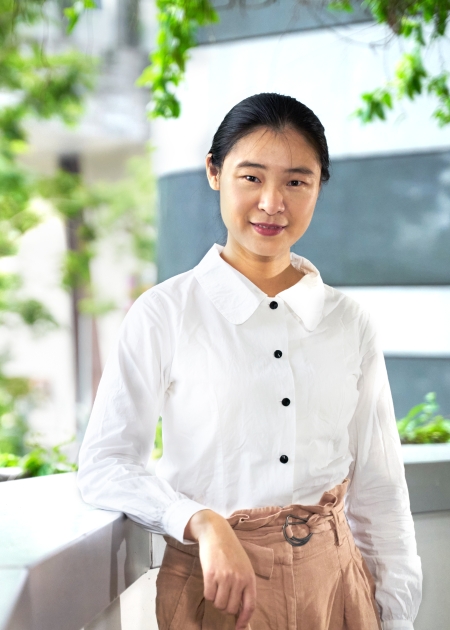Prof Jingyi Xue

Feature on Jingyi Xue, Associate Professor of Economics
School of Economics, Singapore Management University
Axioms to making difficult decisions in an uncertain world
On a day-to-day basis, policymakers grapple with hard decisions. Associate Professor of Economics Jingyi Xue shines light on the guiding axioms that can assist policymakers in achieving outcomes that advance the wellbeing of all members of a society in aggregate.
When policymakers make decisions for a society, their choices affect the welfare of the collective whole. At the same time, these policy changes affect each citizen’s life in completely different ways due to the unique personal situations of every individual.
Through her research, Associate Professor Jingyi Xue sought to understand policymakers and their process of making social decisions. “When you’re making a decision for yourself, you can choose the option that makes yourself happy,” she says. “But policies will have different effects on each individual in society, and this is something that policymakers have to take into account while looking at the bigger picture.”
One of Xue’s studies investigated how resources in a society should be allocated in the face of uncertainty. For example, a government allocates budgets to local authorities to finance the construction of public facilities such as hospitals or roads, according to their respective local demands for such facilities. Since there is typically no way of accurately predicting these actual demands, the government has to rely only on the estimates of local demands to allocate these budgets. However, when we look back after the facilities have been constructed, we may find that the allocation based on the estimates may be far from the actual allocation needed. The lack of accuracy in predicting local demands means that some public facilities may be underutilised, while others may face an overwhelming demand.
“Most of the time, you only know the exact demand for the facility after it is built. But here’s the dilemma—public funds will need to be allocated before this uncertainty is resolved. What’s more, resources are scarce, and overallocation in one area may lead to shortages in another,” she explains, adding that since such mismatches are inevitable, it could even prove difficult to determine when an allocation is desirable.
In the paper, “Equal-quantile rules in resource allocation with uncertain needs”, Xue and her co-authors studied the axioms, or normative criteria, that can guide policymakers in their decision when allocating these resources. “For example, the resource monotonicity axiom says that if the amount of the resource to be allocated increases, no individual in the society should be worse off compared to before,” she says. “Some might receive more than others, but nobody should receive less.”
Social choice in an uncertain world
Xue’s research interest is in individual and collective decision-making under uncertainty, with one of her focuses on fair division in the face of uncertain claims.
She explains that there has been extensive literature on “how to divide a resource among agents who have conflicting claims on the resource”. However, the studies have largely been limited to situations with deterministic claims which can be accurately verified. Little has been done regarding situations in which agents have uncertain claims that arise from their uncertain needs for the resource, she says. “But that’s the case in many real-life situations—we often have to work with incomplete information and cannot reallocate resources thereafter, due to a variety of constraints.”
This area is becoming increasingly important, given the unpredictability of the world we now live in. “For example, during the COVID-19 pandemic, there were limited units of ventilators, and authorities needed to make a call on how many to allocate to each hospital. These are tough decisions to make,” she says.
Balancing trade-offs
Some key applications of her research are in healthcare and emergency management. For example, international emergency management organisations such as The International Red Cross need to determine the quantity of medical supplies to distribute across assistance centres around the world in preparation for an emergency or disaster that has yet to take place. The challenge in this situation is to find a desirable way to allocate resources under uncertainty, that is, before the emergency occurs.
“Since emergency response is time sensitive, we cannot rely on resource reallocation after the emergency occurs,” says Xue. She explains that it could be too time-consuming or too costly to redistribute medical resources after the uncertainty is resolved.
Xue elaborated on how medical supplies, which are often limited in quantity, should be allocated to various assistance centres and the conundrum of having to “sacrifice” some places when allocating more to others. “When dealing with uncertainties, we have to consider the trade-offs that come with every decision we make,” she says.
If the amount of the resource assigned to an assistance centre turns out to exceed its realised need, some of the resource is wasted. On the other hand, if the assigned amount falls short of the centre’s realised need, it will not have enough resources to meet the demands of the injured. In the case of healthcare and emergency services, such outcomes are much harder to deal with. Xue elaborates, “Comparatively, the miscalculation of the demand of a public library, for example, has less serious impact. The library could end up being underutilised or overcrowded—but this is a mild quandary compared to a situation where lives are at stake.”
Despite the difficulty of these decisions, they must still be made. This is where economists including Xue offer valuable insights on how the best outcome—one that advances the wellbeing of all individuals in aggregate—can be achieved. “It’s a very relevant issue, and what makes this research area so meaningful,” she says.